United World Colleges (UWC) calls for public-private partnerships in education to increase social mobility and prepare citizens to address global risks

20 January 2020, Davos - Today Jens Waltermann, Executive Director, UWC International called for the public and private sector to partner in education and act to prepare young citizens from all social backgrounds to address global risks.
“We need leadership for a new kind of education that encourages and supports students from an early age to create positive change and appreciate and address global risks. Empowering education across social divides is needed to address the global risks spelled out in the WEF Global Risks Report 2020. The recently published report Schools of the Future by the WEF puts strong emphasis on public-private partnerships and action in education, which are critical to prepare our young citizens for the new realities,” said Waltermann, who will be speaking at the event “Education for Transformation” on 21.01.2020 in Davos during the World Economic Forum Annual Meeting. “Only when we have citizens who can work across boundaries to come up with shared solutions to shared problems are we on the path to meet the UN Sustainable Development Goals.”
UWC contributed to the white paper published by the World Economic Forum “Schools of the Future: Defining New Models of Education for the Fourth Industrial Revolution”. The report outlines 8 characteristics and skills that define high-quality learning: global citizenship skills, innovation and creativity skills, technology skills, interpersonal skills, personalized and self-paced learning, accessible and inclusive learning, problem-based and collaborative learning, and lifelong and student-driven learning.
With increased social and economic polarization and decreased social mobility it is important that high-quality education is provided across all social divides and not only for the children of the financial elite or from the privileged parts of the world. Children from privileged and less privileged backgrounds need to learn together, the increasing split between private schools for the privileged and public education for all others will drive our societies further apart, Waltermann stressed. “We need to make the flexibility and quality of private education accessible to the many through comprehensive scholarship systems. Not for profit-private schools can play an important role.”
“Only 23% of young refugees for example have any access to secondary education. Yet at UWC you see what happens when local students, privileged and less privileged learn together with young refugees. They are often examples of grit and resilience and they can tell their peers about the reality of conflict. That’s how you teach young people to be curious, compassionate and committed,” says Waltermann.
UWC (United World Colleges) is one of the few international secondary schools that help young refugees access a secondary education by providing them with scholarships for the last two years of their schooling at a UWC school. UWC is the only secondary education organization to have signed a cooperation agreement with UNHCR (The Office of the United Nations High Commissioner for Refugees). UWC has also contributed to the recently published UN Global Compact on Refugees. In addition to its current scholarship program, which supports about two thirds of all students enrolled UWC will grant 100 additional full scholarships every year to students who would usually not even dare to dream of a world-class education.
UWC educates students at its 18 international high schools on four continents and brings together young people from diverse countries, cultures and backgrounds to share dorm rooms, study the rigorous International Baccalaureate program and learn the skills to become changemakers. Since the establishment of the first UWC school in 1962, UWC has always welcomed students with refugee backgrounds from areas as diverse as Syria, Tibet, Colombia and Burundi.
More than two thirds of places for entry in 2020 are reserved for applicants in need of financial assistance, either on full or partial scholarships.
About UWC
UWC (United World Colleges) is a global movement that makes education a force to unite people, nations and cultures for peace and a sustainable future. UWC has a network of 18 international schools and colleges on four continents, with volunteer-run national committees in more than 150 countries. Today, 10,786 students from over 160 countries attend UWC schools (2019 data).
UWC offers a challenging educational experience to a deliberately diverse group of students. It complements the high academic standards delivered through the International Baccalaureate Diploma Programme (IBDP) by placing a high value on experiential learning, community service and outdoor activities.
Admission to a UWC school is independent of socio-economic means, with over 80% of IBDP students selected by a UWC national committee receiving full or partial financial support.
Since the foundation of the first UWC college in 1962, UWC has inspired a network of almost60,000 alumni worldwide, who remain engaged with the UWC movement and committed to creating a more sustainable and peaceful world.
For more information visit www.uwc.org or follow us on social media: Facebook, Twitter and Instagram.
For more information or interviews, please contact:
Ingrid Helsingen Warner
Ingrid.h.warner@leidar.com
+4794878886
